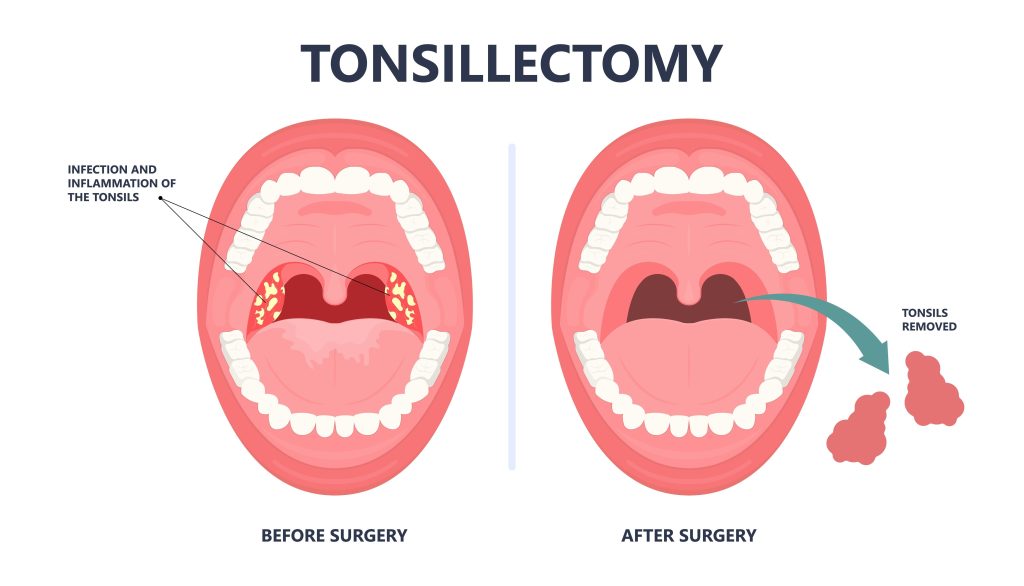Mark Kopec Now
Tonsillectomy
Tonsils, those two lumps of tissue tucked away at the back of your throat, play a role in the immune system, helping fight off infections. But sometimes, these tonsils themselves become the source of trouble, leading to a procedure called a tonsillectomy. If a tonsillectomy causes you injury, you may have a medical malpractice case based on surgical error. You should consult with the Baltimore Tonsillectomy lawyer at the Kopec Law Firm.
Understanding Your Tonsils
Located on either side of the throat, tonsils are part of the lymphatic system, which helps fight infection. They contain white blood cells that trap germs and produce antibodies to fight them off. However, tonsils can become inflamed and enlarged, especially in children, causing a condition called tonsillitis. As you review your experience with tonsillitis, the Baltimore Tonsillectomy Lawyer is available to answer your questions.
When Tonsils Become Troublesome
While tonsillitis is a common childhood illness, a tonsillectomy isn’t always the first line of defense. But there are situations where the doctor may recommend surgery:
- Frequent Tonsillitis: If you experience tonsillitis more than five times a year or have severe episodes lasting longer than a week, a tonsillectomy might be considered.
- Strep Throat: If you have recurrent strep throat infections, a tonsillectomy can help reduce the frequency.
- Sleep Apnea: Enlarged tonsils can obstruct airways, leading to sleep apnea, a condition where breathing repeatedly stops and starts during sleep.
- Tonsil Size: Very large tonsils can cause difficulty swallowing or breathing.
- Tonsillitis Complications: In rare cases, tonsillitis can lead to complications like peritonsillar abscess (collection of pus behind the tonsil) or difficulty breathing.
What Type of Doctor to See and How They Diagnose
If you suspect tonsil trouble, an otolaryngologist (ENT doctor) is the specialist you need. During an appointment, the ENT will ask about your symptoms and medical history. They will also perform a physical examination, looking at your throat and feeling your tonsils for size and swelling.
Several tests can aid diagnosis:
- Throat Culture: The healthcare provider uses a swab to collect a sample of cells from your tonsils to identify any bacterial infection.
- Rapid Strep Test: This quick test can identify strep throat, a common cause of tonsillitis.
- Imaging Tests: In some cases, an X-ray or sleep study might be needed to assess airway obstruction or sleep apnea severity.
The Tonsillectomy Surgery: Removing the Tonsils

A tonsillectomy is typically an outpatient procedure that the doctor performs under general anesthesia, meaning you’ll be asleep and feel no pain. There are several techniques for removing tonsils, each with its own advantages and disadvantages:
- Cold Steel Dissection: This traditional method uses a scalpel to cut and remove the tonsils.
- Coblation: This technique uses radiofrequency energy to remove and cauterize (seal) tissues at the same time, reducing bleeding.
- Laser Tonsillectomy: A laser beam is used to remove the tonsils with minimal bleeding.
- Ultrasonic Dissection: High-frequency sound waves are used to cut and remove the tonsils.
The choice of technique depends on the doctor’s expertise, patient factors, and available equipment. The surgery itself usually takes 30-45 minutes. The Baltimore Tonsillectomy Lawyer at the Kopec Law Firm is available to discuss the outcome of your surgery with you.
Recovery
Recovery from a tonsillectomy can be uncomfortable, especially in the first week. Common symptoms include:
- Sore Throat: This is the most common complaint, lasting up to two weeks.
- Earache: The pain can radiate to the ears due to shared nerve pathways.
- Difficulty Swallowing: Soft, cool foods are recommended during this time.
- Bad Breath: This is temporary and can be managed with good oral hygiene.
Pain medication and plenty of rest are crucial for a smooth recovery. Most people can return to normal activities within 10-14 days.
Living Without Tonsils
Most people experience significant improvement in their quality of life after a tonsillectomy. However, it’s important to understand that tonsils do play a role in the immune system. Without them, you might be slightly more susceptible to upper respiratory infections, although usually not as severe.
Potential Risks and Complications from the Baltimore Tonsillectomy Lawyer
There can be a bad outcome following a tonsillectomy. Potential injuries include:
- Bleeding: This can occur shortly after surgery or even a week later.
- Infection: There’s a chance of developing an infection at the surgical site.
- Anesthesia Risks: These can include allergic reactions or breathing problems.
Medical Malpractice: When Things Go Wrong and You Need the Baltimore Tonsillectomy Lawyer
If you believe a medical professional’s error caused harm during your tonsillectomy, you might have grounds for a medical malpractice claim. Here are some examples:
- Misdiagnosis: If a doctor misses a sign of a serious underlying condition, leading to unnecessary surgery.
- Surgical Errors: Mistakes during surgery can cause bleeding, damage to surrounding tissues, or incomplete removal of tonsils.
- Anesthesia errors: Improper administration of anesthesia can lead to complications.
Next Step – Call the Baltimore Tonsillectomy Lawyer
Tonsillectomy is often a common and effective surgery for treating chronic tonsil problems. However, if a tonsillectomy has caused you injury, visit the free consultation page or video. Then contact the Kopec Law Firm at 800-604-0704 to speak directly with Attorney Mark Kopec. He is a top-rated Baltimore medical malpractice lawyer. The Kopec Law Firm is in Baltimore and pursues cases throughout Maryland and Washington, D.C.





